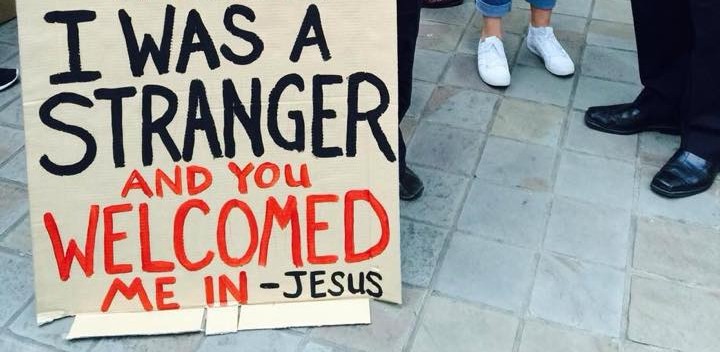Guest post by Captain Sandra Pawar
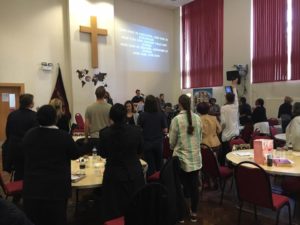 In 1912, General William Booth, founder of The Salvation Army, entered the Royal Albert Hall in London to give his last, most notable address to a packed crowd of 7,000 Salvationists. The most famous part of this speech is:
In 1912, General William Booth, founder of The Salvation Army, entered the Royal Albert Hall in London to give his last, most notable address to a packed crowd of 7,000 Salvationists. The most famous part of this speech is:
“While women weep, as they do now, I’ll fight
While little children go hungry, as they do now, I’ll fight
While men go to prison, in and out, in and out, as they do now, I’ll fight
While there is a drunkard left,
While there is a poor lost girl upon the streets,
While there remains one dark soul without the light of God,
I’ll fight-I’ll fight to the very end!”
I have always loved this part of his speech and found it incredibly powerful. I loved the heart and passion behind it. I believe it was not only relevant for what was needed in the early century but I believe it is still relevant today and a call to mission for us.
There are still women weeping and there are still young girls lost upon the streets and there is still a need for people to fight for and with them.
There are women and young girls being trafficked around this world and in this country on a daily basis, there are women and young girls being exploited, there are women and young girls who have no safe place to live, there are women and young girls who are being abused by husbands and boyfriends. There are babies being murdered just because they are girls. There are women and young girls who are fleeing war torn countries only to be put on boats that sink or sent to refugee camps that are in incredibly bad condition offering barely any hope.
It is for these young girls and for these women that we must learn to fight.
As followers of Jesus Christ we have strategic responsibility to become aware of the conditions for many young girls and women not only around the world but in our local communities and we need to raise the alarm to others and we must do something with what we know.
I feel like my life has been full of different experiences that have led me to having this full on passion to do something for women and because of all these different experiences whether it be working with young homeless girls on the streets of Sydney who were being prostituted by other homeless young people or whether it be the older women I met in the women’s shelter who were being abused by their lovers and husbands or the women I met in the strip clubs in Atlanta or the rescued young girl with AIDS in India who did henna on my feet for my wedding as a way to escape the red light district. Each one of these women that I have met has stirred a deep passion in me to fight for them and with them.
God has a deep deep love for women, for girls and now that I am aware of all the various circumstances women and young girls find themselves in and the often horrific situations they face I cannot stand back and pretend it doesn’t happen. I must do something.
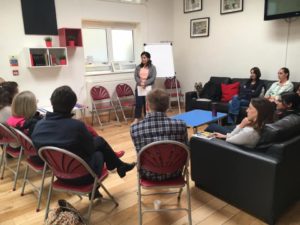 So the justice conference “While Women Still Weep” held at Southwark Corps recently was my effort to do something. An effort to bring awareness to others, to create a day, a moment where God could speak and stir our hearts to action. We had speakers from International Justice Mission talking about the international efforts being made to rescue and restore, we had speakers from local Salvation Army chapters like Faith House and the Territorial department for Anti Human trafficking to give us information on local situations and how we could join the fight. A representative from Citizens Uk was there to speak about the importance of listening to people’s stories and Stephanie Chagis Bijl talked about joining the justice fight through prayer.
So the justice conference “While Women Still Weep” held at Southwark Corps recently was my effort to do something. An effort to bring awareness to others, to create a day, a moment where God could speak and stir our hearts to action. We had speakers from International Justice Mission talking about the international efforts being made to rescue and restore, we had speakers from local Salvation Army chapters like Faith House and the Territorial department for Anti Human trafficking to give us information on local situations and how we could join the fight. A representative from Citizens Uk was there to speak about the importance of listening to people’s stories and Stephanie Chagis Bijl talked about joining the justice fight through prayer.
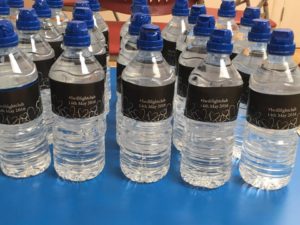 It was a day where hopefully people came away with some practical tools and ideas on how they could join the fight. Once you know, you can no longer stand back and do nothing.
It was a day where hopefully people came away with some practical tools and ideas on how they could join the fight. Once you know, you can no longer stand back and do nothing.
Some of the steps that people have been encouraged to take after the conference are:
- Look into partnering with Citizens UK or any other organization that fights against injustice in their local communities
- Set aside time to pray daily for any issue that God has laid on their heart in regards to the injustices facing women and children. One such prayer need was cyber trafficking especially in Thailand
- Volunteer to be either a driver or passenger for the Anti Human trafficking department’s transportation program
- Volunteer with Faith House on their prayer walks and ministry with exploited women
- Give financially to an organisation that is making a difference in the lives of women and children
- Bring awareness to others about these issues and encourage others to take action
- Think about purchases you make and how they may be affecting women and young children around the world. Buy ethically.
- Attend the next ‘While Women Still Weep Justice Conference ‘on March 18th 2017
While Women STILL weep….I will fight.
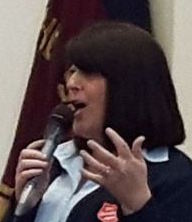 Sandra Pawar is currently the Corps Officer at Southwark Corps. She is passionate about seeing broken lives made whole, captives set free and chains of injustice broken.
Sandra Pawar is currently the Corps Officer at Southwark Corps. She is passionate about seeing broken lives made whole, captives set free and chains of injustice broken.
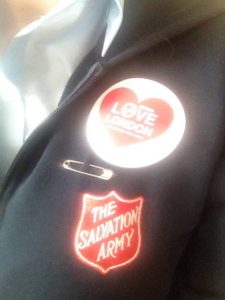 Yesterday London Citizens joined together to stand outside 30 stations across London to change a dark narrative that has been stirring in the city. Some say it’s a result of the ‘leave’ decision – others say that it’s been there all along. We stood because we believe in a different story!
Yesterday London Citizens joined together to stand outside 30 stations across London to change a dark narrative that has been stirring in the city. Some say it’s a result of the ‘leave’ decision – others say that it’s been there all along. We stood because we believe in a different story!
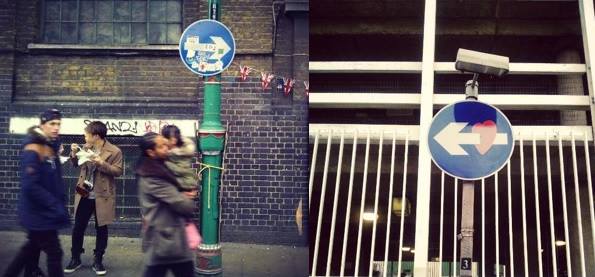
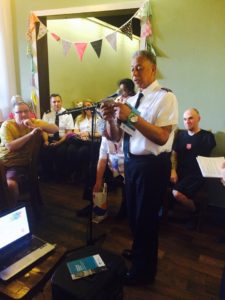 In terms of theological, devotional and motivational material urging us forward in the fight we have never had it so good. The biblical mandate for action is being preached with new fervour in the light of austerity, political upheaval and the refugee crisis. Resources are plentiful – campaign material regularly finds its way into our letterbox, email inbox and social media feeds. Dutifully we follow the instructions to pray, fundraise, get informed and click on the link to another petition website. Online activity in the cause of social change has led to the coining of a new word – ‘clicktivism’. Apparently we’re clicking like we’ve never clicked before. Yet beneath it all comes that nagging question – is any of this really making a difference? It all feels so detached. There’s surely more to justice-seeking than this.
In terms of theological, devotional and motivational material urging us forward in the fight we have never had it so good. The biblical mandate for action is being preached with new fervour in the light of austerity, political upheaval and the refugee crisis. Resources are plentiful – campaign material regularly finds its way into our letterbox, email inbox and social media feeds. Dutifully we follow the instructions to pray, fundraise, get informed and click on the link to another petition website. Online activity in the cause of social change has led to the coining of a new word – ‘clicktivism’. Apparently we’re clicking like we’ve never clicked before. Yet beneath it all comes that nagging question – is any of this really making a difference? It all feels so detached. There’s surely more to justice-seeking than this.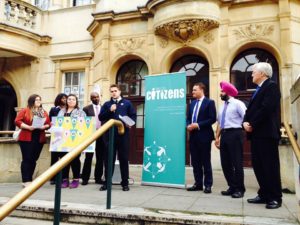 The beginning of justice-seeking is neither an action nor a programme. As an officer once reminded me: ‘We don’t do social justice – we live justly.’ In Salvation Army theology it springs from our holiness teaching, where the inner life of a believer, orientated around a relationship with God, spills over into public life. Faith may be personal but it’s never private. The inner working of our hearts is manifested in hundreds of actions and decisions we make every day. Living a just life begins with how we treat others, who we include, how we use our wealth and time. This applies to those closest to us, neighbours and work colleagues, our corps family and, by extension, the whole of humanity. The rather wonderful truth I’ve discovered is that the more I’ve chased personal holiness the more compelled I’ve been to seek a just world and the more justice-seeking I’ve engaged with the more convicted I’ve been about personal transformation.
The beginning of justice-seeking is neither an action nor a programme. As an officer once reminded me: ‘We don’t do social justice – we live justly.’ In Salvation Army theology it springs from our holiness teaching, where the inner life of a believer, orientated around a relationship with God, spills over into public life. Faith may be personal but it’s never private. The inner working of our hearts is manifested in hundreds of actions and decisions we make every day. Living a just life begins with how we treat others, who we include, how we use our wealth and time. This applies to those closest to us, neighbours and work colleagues, our corps family and, by extension, the whole of humanity. The rather wonderful truth I’ve discovered is that the more I’ve chased personal holiness the more compelled I’ve been to seek a just world and the more justice-seeking I’ve engaged with the more convicted I’ve been about personal transformation.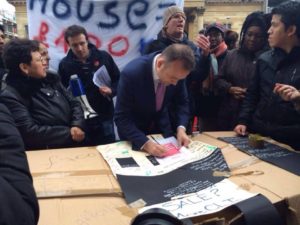 While justice begins with God, it clearly involves people. In the Exodus story the groans of the Israelite slaves rise up before God and initiate a social justice movement (Exodus 2:23–25). In today’s world we constantly hear the groans for ourselves – the low-paid worker at the food bank, the refugee, the homeless and the discriminated against. Most of us long to end such suffering. The uncomfortable truth, however, is that real justice-seeking compels us to move to the edges and experience first-hand the sufferings of others before we can act. There really is no other way. Of course when we get there we discover God is well ahead of us.
While justice begins with God, it clearly involves people. In the Exodus story the groans of the Israelite slaves rise up before God and initiate a social justice movement (Exodus 2:23–25). In today’s world we constantly hear the groans for ourselves – the low-paid worker at the food bank, the refugee, the homeless and the discriminated against. Most of us long to end such suffering. The uncomfortable truth, however, is that real justice-seeking compels us to move to the edges and experience first-hand the sufferings of others before we can act. There really is no other way. Of course when we get there we discover God is well ahead of us.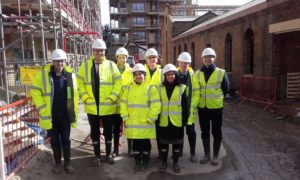 Once personally involved in the sufferings of others, it is tempting to offer charity and stop there. We meet the need, bandage the wound and move on. Most likely people will call us saints.
Once personally involved in the sufferings of others, it is tempting to offer charity and stop there. We meet the need, bandage the wound and move on. Most likely people will call us saints.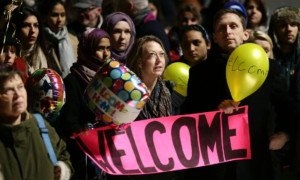 The final stage is to move from a protest voice on the margins into the corridors of power, where decisions are made. Forcing your way into this space can happen only when we organise ourselves to be powerful enough for decision-makers to take notice. This is the work of politics – not party politics – but community-based, people politics. And this is where corps and centres come into their own. After all, we know our communities and, in most cases, we have been a constant presence for generations. Almost every local expression is connecting directly with those who suffer injustice and, crucially, we are collectives who exist to transform the world! In a society where institutional
The final stage is to move from a protest voice on the margins into the corridors of power, where decisions are made. Forcing your way into this space can happen only when we organise ourselves to be powerful enough for decision-makers to take notice. This is the work of politics – not party politics – but community-based, people politics. And this is where corps and centres come into their own. After all, we know our communities and, in most cases, we have been a constant presence for generations. Almost every local expression is connecting directly with those who suffer injustice and, crucially, we are collectives who exist to transform the world! In a society where institutional In 1912, General William Booth, founder of The Salvation Army, entered the Royal Albert Hall in London to give his last, most notable address to a packed crowd of 7,000 Salvationists. The most famous part of this speech is:
In 1912, General William Booth, founder of The Salvation Army, entered the Royal Albert Hall in London to give his last, most notable address to a packed crowd of 7,000 Salvationists. The most famous part of this speech is: So the justice conference “While Women Still Weep” held at Southwark Corps recently was my effort to do something. An effort to bring awareness to others, to create a day, a moment where God could speak and stir our hearts to action. We had speakers from International Justice Mission talking about the international efforts being made to rescue and restore, we had speakers from local Salvation Army chapters like Faith House and the Territorial department for Anti Human trafficking to give us information on local situations and how we could join the fight. A representative from Citizens Uk was there to speak about the importance of listening to people’s stories and Stephanie Chagis Bijl talked about joining the justice fight through prayer.
So the justice conference “While Women Still Weep” held at Southwark Corps recently was my effort to do something. An effort to bring awareness to others, to create a day, a moment where God could speak and stir our hearts to action. We had speakers from International Justice Mission talking about the international efforts being made to rescue and restore, we had speakers from local Salvation Army chapters like Faith House and the Territorial department for Anti Human trafficking to give us information on local situations and how we could join the fight. A representative from Citizens Uk was there to speak about the importance of listening to people’s stories and Stephanie Chagis Bijl talked about joining the justice fight through prayer. It was a day where hopefully people came away with some practical tools and ideas on how they could join the fight. Once you know, you can no longer stand back and do nothing.
It was a day where hopefully people came away with some practical tools and ideas on how they could join the fight. Once you know, you can no longer stand back and do nothing. Sandra Pawar is currently the Corps Officer at Southwark Corps. She is passionate about seeing broken lives made whole, captives set free and chains of injustice broken.
Sandra Pawar is currently the Corps Officer at Southwark Corps. She is passionate about seeing broken lives made whole, captives set free and chains of injustice broken. 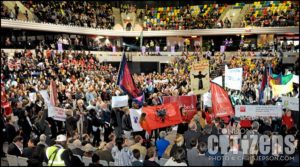 Last night saw around 6,000 people gather at the Copper Box arena in Olympic Park in Stratford for the Citizens UK London Mayoral Assembly. Front runners in the mayoral race Zac Goldsmith and Sadiq Khan were present and made encouraging commitments on housing, refugees and the Living Wage. The night also saw a fantastic presence of London Salvationists, with nearly 200 present from William Booth College and 10 London corps: Ilford, Stepney, Raynes Park, Southwark, Nunhead, Camberwell, Bromley, Wimbledon, Woodford and Mitcham. The College band played during the assembly and Captain John Clifton negotiated with Zac Goldsmith on his reaction to Citizens’ asks on Community Land Trusts. More information and reaction will be posted in the coming days, but we thought it would be good to simply share a small selection of the pictures from the assembly to remember a wonderful night:
Last night saw around 6,000 people gather at the Copper Box arena in Olympic Park in Stratford for the Citizens UK London Mayoral Assembly. Front runners in the mayoral race Zac Goldsmith and Sadiq Khan were present and made encouraging commitments on housing, refugees and the Living Wage. The night also saw a fantastic presence of London Salvationists, with nearly 200 present from William Booth College and 10 London corps: Ilford, Stepney, Raynes Park, Southwark, Nunhead, Camberwell, Bromley, Wimbledon, Woodford and Mitcham. The College band played during the assembly and Captain John Clifton negotiated with Zac Goldsmith on his reaction to Citizens’ asks on Community Land Trusts. More information and reaction will be posted in the coming days, but we thought it would be good to simply share a small selection of the pictures from the assembly to remember a wonderful night: 